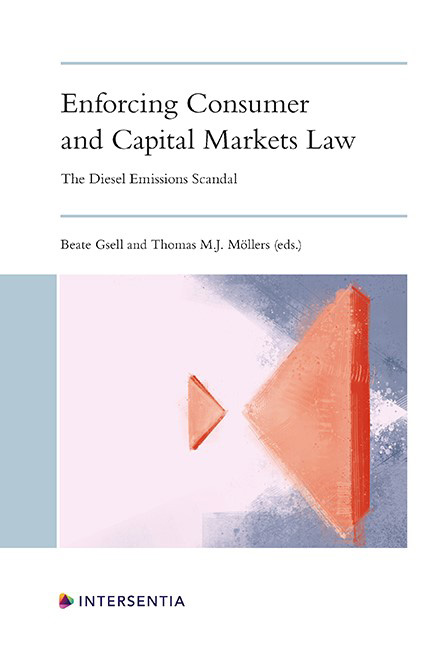Book contents
- Frontmatter
- Acknowledgement
- Contents
- List of Cases
- List of Abbreviations
- List of Contributors
- PART I INTRODUCTION
- PART II EUROPE
- PART II BEYOND EUROPE
- PART III THE SUPRANATIONAL PERSPECTIVE
- PART IV LEGAL PRACTICE PERSPECTIVE
- PART V INTRADISCIPLINARY ANALYSIS AND REFORM RECOMMENDATIONS
- Key Source Bibliography
- Index
- About the Editors
Enforcing Consumer and Capital Markets Law in the United States
Published online by Cambridge University Press: 22 December 2020
- Frontmatter
- Acknowledgement
- Contents
- List of Cases
- List of Abbreviations
- List of Contributors
- PART I INTRODUCTION
- PART II EUROPE
- PART II BEYOND EUROPE
- PART III THE SUPRANATIONAL PERSPECTIVE
- PART IV LEGAL PRACTICE PERSPECTIVE
- PART V INTRADISCIPLINARY ANALYSIS AND REFORM RECOMMENDATIONS
- Key Source Bibliography
- Index
- About the Editors
Summary
Consumers with similar claims in the United States (US) often join forces to pursue remedies using class actions. This allows them to obtain remedies with little cost and effort and serves a ‘private attorney general’ function by bringing light to purchase problems and deceptive practices that may otherwise be ignored. This is especially true in small dollar claims, where the cost to individually litigate is disproportionate to the eventual judgment. However, some have criticised class actions in the US for forcing settlements and padding the pockets of lawyers, while leaving consumers with minimal pay-outs. This chapter will provide an overview of how enforcement and class actions operate in the US, using the Volkswagen (VW) case as an example. This chapter will also initiate ideas for using online dispute resolution (ODR) for consumer claims as means for expanding access to remedies and opening an alternative to class actions. The hope is that this chapter will engage renewed interest in global access to remedies, especially in cases like Dieselgate where consumers throughout the world suffer similar harms.
INTRODUCTION
Borders lose meaning as consumers purchase goods from all over the world and manufacturers set up shop overseas. However, borders matter when disputes develop due to jurisdictional differences in laws and procedures for obtaining remedies. This is especially true when it comes to deceptive trade practices, like when Volkswagen (VW) used software in its diesel engines to manipulate emission levels. This manipulation gave rise to ‘Dieselgate’ and an eruption of lawsuits in the US that have helped many consumers obtain compensation. Meanwhile, some have complained that many consumers in Europe have yet to receive remedies due to arguably limited procedures for obtaining redress on such mass claims.
Consumers all over the world may suffer the same harms but have very different remedies depending on where they live. For example, many consumers in the US obtained remedies related to Dieselgate before their European counterparts. It is therefore critical to consider legal redress mechanisms on a global scale. Businesses and policymakers must address differences in consumer redress systems and collaborate to create mechanisms that operate efficiently and fairly for consumers regardless of residence.
- Type
- Chapter
- Information
- Enforcing Consumer and Capital Markets LawThe Diesel Emissions Scandal, pp. 339 - 362Publisher: IntersentiaPrint publication year: 2020
- 1
- Cited by

